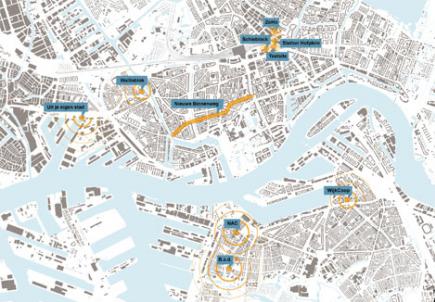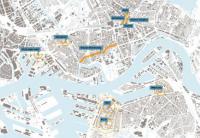Periode 2013–2014 / Project Self-Organization in Urban Realm / Opdrachtgever AESOP, gemeente Rotterdam / Locatie Rotterdam / Met Arie Lengkeek, Beitske Boonstra, Christian Quist, Frank van den Beuken, Martin Aarts


Rotterdam is a city in transition. Once a strongly governmental-led and top-down planned city, the municipality and other major planning institutions such as developers and housing cooperations, are now looking for different ways to achieve their ambitions in city re-development. More cooperation with civic society and step-by-step development through non-governmental initiatives is seen as the way forward. Meanwhile, civic initiatives are emerging throughout the city and are still struggling to find their way through existing, governmental-led planning routines. This Mobile Track deals with the question how successful co-evolution and horizontal partnerships between these two worlds can be achieved.
Questions of the Mobile Track
1. What conditions will allow these alternative practices to transform to fundamental actors?
2. What is the role of the government and planners in shaping these conditions?
3. How can we create a learning community, which involves initiators, policymakers, and scientists on equal terms?
Cases Visited
Zomerhofkwartier.
"A neighbourhood for cultural production ‘the City as it is’"
Ten years are given by the major local landlord, Housing Cooperation Havensteder, to change the deprived business quarter (ZoHo) at the edge of Rotterdam’s city centre, into a vibrant, innovative working area. The area is step-by-step redeveloped in a new coalition between creative entrepreneurs, professional place-makers as a “new urban solidarity” through co-makership with the professional networks of the creative fields with different skills, and the Erasmus University. Havensteder and STIPO, public developers in Rotterdam take the lead in this proces. Innovative entrepreneurs are attracted, vacant buildings become re-occupied, and cultural activities are organized. The development and coalition prosper as it is embedded within the local context and the individual commitment is high.
Station Hofplein.
"Formal planning for creative connectivity"
Under the arches of the elevated train-line Hofpleinlijn, originally a privately funded railway between Rotterdam and The Hague, but years out of use, the Station Hofplein opened its doors. This development took place through a formal planning process, but due to a shortage of affordable spaces in Rotterdam, soon many young, creative entrepreneurs were attracted to the area. Now they are running their businesses, independent art and music-festivals are programmed on the shared rooftop and in the communal inner-area. The Station Hofplein has become a valuable cultural and creative connection between the city centre and the northern neighbourhoods.
Luchtsingel.
"Connecting initiatives and revitalising public space."
The Luchtsingel is a wooden bridge crossing the main railroad connecting the Rotterdam Central Sta-tion area with the Hofbogen and ZoHo. It is part of Test Site Rotterdam (IABR5 Making City): a strategic experiment to revitalize the area using alternative forms of funding, planning processes and design tools. Started as a crowd funded project, it was later also generously supported by the Municipality through the ‘stadsinitiatief’. The Test Site project includes the Roof Gardens (DakAkker) and Park Pompenburg.
Schieblock.
"Temporary use of vacant spaces."
The Schieblock is a private initiative of two area-based entrepreneurs with the support of a local, private developer and the municipality. Their ambition was to create a living laboratory for urban transformation through temporary use of vacant office-buildings in the central station area. Five years later the Schieblock is firmly attached to the city with its Luchtsingel, the Beergarten, the Roof Garden and many in-house companies in the creative sector. Their contract for temporary use has recently been extended.
Nieuwe Binnenweg.
"No interventions have created a gap for valuable transformation."
The Nieuwe Binnenweg is a mixed-use shopping street characteristic of pre-war Rotterdam. For years, the street had been in decay, but over the last ten years the street improved significantly in quality of the public domain and in business opportunities. The process was driven by joint forces of local government, local entrepreneurs and their networks. The earlier period of non-intervention and decay became the unique driver for redevelopment, as the characteristics of the street and buildings were saved and the prices had remained low, which now makes the street attractive for creative and innovative entrepreneurs.
Wallisblok
"From the inside out to the public domain."
Spangen was a neighbourhood characterized by severe socio-economic problems. In the Wallisblok-project, deprived apartments were sold for nothing to individual households who committed themselves to regenerate the housing block. This project expressed the value of collective production, and from there on, various other self-organized initiatives emerged, bring-ing transformation and investment to the area. Natuurlijk Spangen for instance, aims at greening the area with urban agriculture, and through ‘Wij Delfshaven’, also a more formal political representation is sought.
B.a.d. & N.A.C.foundations
"Freedom, responsibility and communal trust."
Once squatters of empty school buildings, the artists that nowadays work and live in the buildings occupied by B.a.d. and NAC, make valuable contributions to the regeneration of the neighbourhood, in exchange for low rents. Houses, studio-spaces and (cultural) facilities are provided and many initiatives to improve the public space in the neighbourhood have been undertaken. The partnership among the artists and, informally, the local authorities, is based on trust, common sense and adventure. Which proves to be crucial for the self-esteem of the neighbourhood. Due to the long-term commitment of the artists, Charlois has become the arrival place for international cultural up-coming talent arriving in the Netherlands.
WijkCooP
"Radicalising the local."
The first Neighbourhood Cooperative of Rotterdam has recently been established in the Afrikaanderwijk. Originated in the context of Jeanne van Heeswijks’ Freehouse art project, a radically new and local form of self-organization and self-determination is set up, aiming to close the circles of investment, production and creative value in the neighbourhood. The skills of local inhabitants and shopkeepers are connected to production needs of artists, designers, catering-service companies and public space. The WijkCoop is a juridical form chosen to further secure and deploy the gathered capacities, to pull the financial flows surrounding the area inwards and to cooperatively extract capital for social, intellectual and affective values. This does not only improve the individual situation of inhabitants, but also the situation and position of the area.
Uit je eigen stad.
"Political goodwill and farmers’ hands-on mentality."
‘Uit je eigen stad’ is a business initiative with the ambition to bring food production back to city dwellers. The Urban Farm is a showpiece for local production: fruit, vegetables are grown on site with aquaponics, composting and a chicken farm. An on-site restaurant and store accompany the farmland in an industrial zone of the Rotterdam harbour. The initiators work on the basis of a partner model with the authorities, educational institutions, the private sector and the academic world. The farm is a legal-precedent, as the Dutch law had no regulations for urban farming, other than the rules for large-scale agriculture businesses. Political goodwill, the farmers’ hands-on mentality and a business model made the initiative happen.
AESOP
The Mobile track is organised as part of the AESOP-conference 2014.
AESOP is the international association between planning schools of Europe. Through international exchange of scholarship and experience, AESOP takes a leading role in the debate about the profession of spatial planning. This years’ Annual Congress is organized around the theme ‘From control to co-evolution’. It addresses changes in planning due to an ongoing confrontation with societal complexity. www.aesop-planning.eu